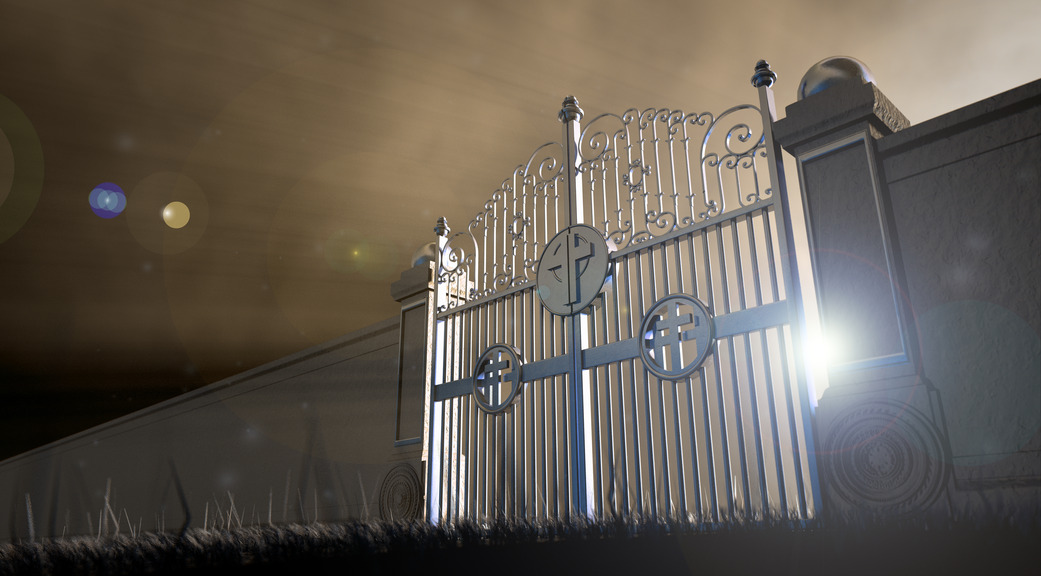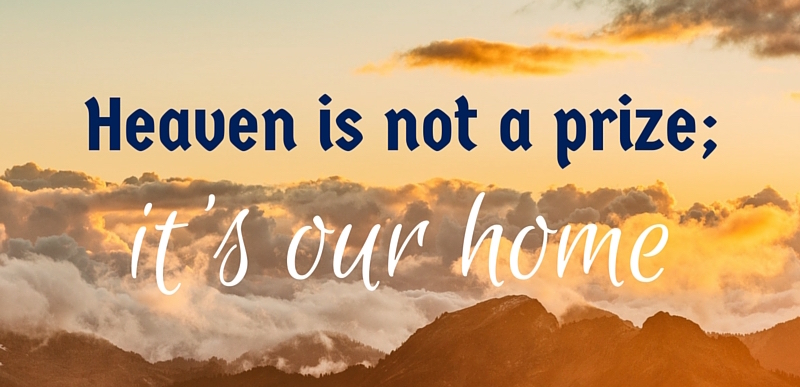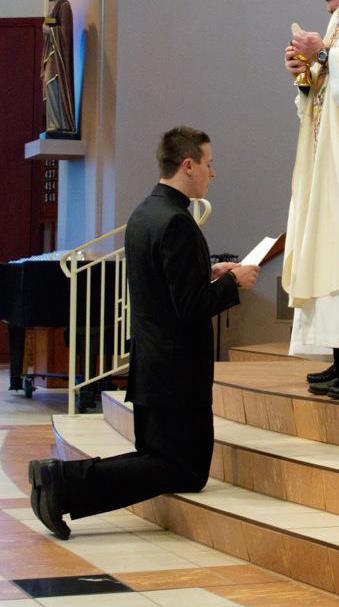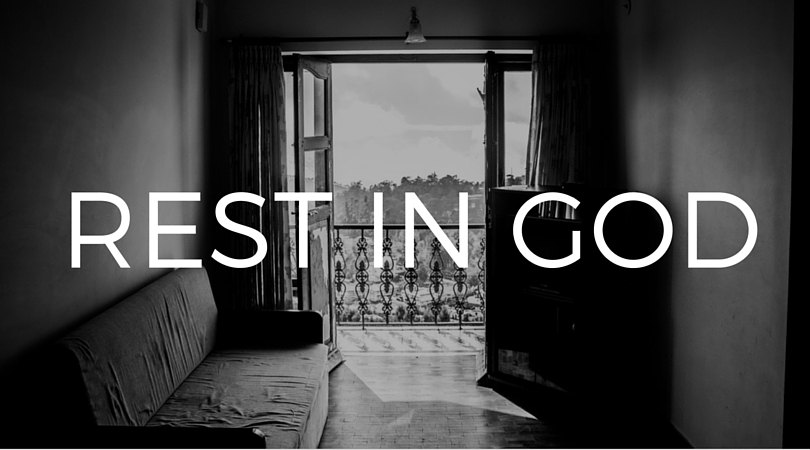 Our popular Catholic imagination tends to obsess with what happens after we die. The mystery of transcending our earthly human limitation fascinates us. Heaven—or as Jesus calls it, God’s kingdom—is the perfect world God intended for us. We lost that world when our first parents sinned. Since then, and even despite Jesus’ merciful act of gaining back that kingdom for us, we remain obsessed with the possibility of going to hell. Saint Ignatius was driven not just by a tremendous love for God but also by a fear of eternal damnation. I think many of us operate this way as well. I desire not to soften the reality of sin and evil, but to raise some questions that don’t tend enter the Catholic imagination enough.
Our popular Catholic imagination tends to obsess with what happens after we die. The mystery of transcending our earthly human limitation fascinates us. Heaven—or as Jesus calls it, God’s kingdom—is the perfect world God intended for us. We lost that world when our first parents sinned. Since then, and even despite Jesus’ merciful act of gaining back that kingdom for us, we remain obsessed with the possibility of going to hell. Saint Ignatius was driven not just by a tremendous love for God but also by a fear of eternal damnation. I think many of us operate this way as well. I desire not to soften the reality of sin and evil, but to raise some questions that don’t tend enter the Catholic imagination enough.
Justice
Let’s first start with God’s understanding of justice. Justice, in our human understanding, is a balancing of the scales. Some may picture God as a bookkeeper, keeping mark of your sins, and the eternal consequence is proportional to your sin. Others might imagine heaven guarded by pearly gates where St Peter interrogates you before admission is granted. “What do you have to say for yourself?” he might ask. Answer wrong or have too many black marks on your dossier and you fall through the trapped door to the eternal fires below.
 Justice in God’s understanding is founded in love and mercy. Jesus’ only talk of the final judgment was in Matthew 25 when he introduces the corporal works of mercy. “Amen, I say to you, what you did not do for one of these least ones, you did not do for me” (25:45). Perhaps Saint Peter’s question would be more along the lines of, How did you care for the most vulnerable in your life? Not about how often you missed Mass or whether you perfectly followed the commandments.
Justice in God’s understanding is founded in love and mercy. Jesus’ only talk of the final judgment was in Matthew 25 when he introduces the corporal works of mercy. “Amen, I say to you, what you did not do for one of these least ones, you did not do for me” (25:45). Perhaps Saint Peter’s question would be more along the lines of, How did you care for the most vulnerable in your life? Not about how often you missed Mass or whether you perfectly followed the commandments.
The Christian life certainly includes worship and following God’s law, but those choices are a love-response to God, motivated by our relationship with God – not motivated by a fear of hell.
Condemnation or Salvation?
In December, Commonweal Magazine published an article entitled “Hell, Population Zero”. It examines the development of the traditional view of hell, a place of eternal torment where those who do evil in their life are destined for. Saint Augustine saw broken humanity as completely deserving of such damnation. Throughout the centuries the Church has reaffirmed hell as a place of eternal punishment.
The Council of Florence in 1442 maintained that “not only pagans, but also Jews, heretics and schismatics” are precluded from salvation for they “will enter into eternal fire” unless they embrace the Catholic Church before their death. (“Hell, Population Zero“, Commonweal Magazine, December 2, 2015)
The crux of the Commonweal piece is that there is a place in theology that hopes hell to be empty. We speak of God as being “infinitely merciful”, yet we treat God as a deity of the primal religions, where the purpose of humanity’s existence is solely to please a distant god through offerings and sacrifices. While the God of Christianity certainly seeks worship and personal sacrifice, what makes Christianity different from other religions is the invitation to an intimate relationship with the divine. Indeed, this is what Ignatian spirituality seeks to imbue its practitioners with: a desire for an intimate relationship with the Creator through the person of Jesus Christ. And so the question of hell remains. Is it a place of punishment or a consequence of rejecting that intimate relationship?
Our tradition has put so much focus on deathbed conversions that we act as if God’s mercy and desire for our salvation stops at death. Yet, I wonder who, when face to face with God after death, can reject God? Would God offer a final invitation to that intimate relationship even after our earthly life? My students posed the question of whether Judas, the disciple who betrayed Christ, could have made it to heaven. Judas did die in shame of his crime. If given another chance after his death, could he still have rejected God? This is the question the Off-Broadway play The Last Days of Judas Iscariot grappled with by putting Judas on trial.
 God is always inviting us to God’s self. According to the first pages of Genesis, we were made to be in communion with God and to rule over the earth with God. If Christ’s act on the cross opened up that lost world for us again, why do we place gates before heaven (even pearly ones)? We speak of heaven as a “reward” as if it’s for a privileged few rather than a state of eternal familyhood with our Parent-Creator. Heaven is what God so deeply desires for all of us that Jesus talks of desperate searching for a lost sheep and coin and the rejoicing of the return of the prodigal son. Heaven—God’s kingdom—is what God intended for us from the beginning. Heaven is not a prize; it’s our home.
God is always inviting us to God’s self. According to the first pages of Genesis, we were made to be in communion with God and to rule over the earth with God. If Christ’s act on the cross opened up that lost world for us again, why do we place gates before heaven (even pearly ones)? We speak of heaven as a “reward” as if it’s for a privileged few rather than a state of eternal familyhood with our Parent-Creator. Heaven is what God so deeply desires for all of us that Jesus talks of desperate searching for a lost sheep and coin and the rejoicing of the return of the prodigal son. Heaven—God’s kingdom—is what God intended for us from the beginning. Heaven is not a prize; it’s our home.
Living the Christian life demands fearing not, not quivering in fear of a God who, if we make a wrong move, will open the trapped door to hell. Living a Christian life is not about blindly following a list of rules, but about responding to God’s infinite love and mercy by turning from sin and lifting others out of poverty. St Ignatius knew that a response of love to God could never fully repay God for all the love poured out on us. He knew our finitude and imperfection.
John 3:17 reminds us that “God did not send the Son into the world to condemn the world, but in order that the world might be saved through him” (NRSV). Infinite mercy means incomprehensible mercy. Infinite mercy does not mean condemnation, but hope in Christ who came to redeem us from sin and death.
Can we, in this Jubilee Year of Mercy, accept God’s infinite mercy offered to all people?
Related posts:
Listen to an audio version of this post…
Music by Kevin MacLeod









Thanks Andy. This one is a “keeper” ! “Heaven is not a prize: it’s our home” will be written in capital letters in my journal. All I have to do then is to live up to it!
Thank you so much. This is what I have always believed but have never been able to express. My image has been God waiting with his arms wide open for a big hug and both holding me up and walking me in.
I don’t have the gift of communication that you have been given, so I hope I can get my thoughts across clearly. I disagree with a few of your ideas.
If there is Infinite mercy, even after death, what is the purpose of the final judgement? Is not the parable of Lazarus and the rich man a story of judgement, told by Jesus? What of the story of the separating of the sheep and the goats?
Yes, Gods’ mercy is infinite. Yes, God is love. Yes, heaven is our home. And yes, we can choose not to accept that love and mercy. But I don’t think that it can be accepted after death. We have to accept it now, here in this earthly life. And we accept it by giving it away.
There will be a final judgement. And I believe it will relate directly to the parable of the Talents. We have ALL been given the gift of mercy and the gift of love. We have ALL been given gifts of time talent and treasure. We will be judged on what we did with those gifts. Did we keep them for ourselves, or did we give them away to others? In other words, did we care for those Jesus brought into our lives? We will not have to be so much “judged” by God, we will judge ourselves. In essence, we are judging ourselves today. St. Paul didn’t say you have to WIN the race, he said you have to RUN the race, meaning, asking God for forgiveness for my selfish actions/words/thoughts today, and trying to do better tomorrow. That’s what repentance is. God is going to ask us if we tried. And He knows our heart, did we do it because we had to (fear of God), or did we do it because we want to (love of God).
If we want heaven to be our home in the future, we must start practicing how to live there, now! Live in the Kingdom TODAY!
Andy,
Excellent job. This is by far one of the best pieces you have written. Very inspired by the Holy Spirit. St. Therese, who I am very partial to, said, “I believe in a hell, but it is empty.” Many saints and theologians affirm her thoughts. I also agree with you that when our human bodies die, our mind, which has the capacity to hold on to resentment and justify hatred and malice, is dead. Our brain doesn’t survive the process of death. So, without the ability to judge and rationalize our resentments and other misdeeds, who wouldn’t dive right into divine love and forgiveness? I have never died, but I suspect that after death, we are free to finally make the best and most loving of decisions and that probably includes choosing God — hands down.
Andy:
As a cradle Catholic I also went to Catholic schools straight through graduate school. Asking these questions for over 18 yrs and beyond, I never received an answer. I would argue vehemently that God by definition could not possibly include philosophically let alone theologically limbo, purgatory, or hell. Can you imagine my arguments with both the O.P.s and the S.Js!!!!! With the pastoral leadership of Pope Francis, it is imperative to work with him on the local level to carry this and other historical misinterpretations to the faithful….Perhaps you can touch on another issue basic to the deeper understanding of the Pope’s message; that of “God does not interfere with his own laws.
Joanna, I am not a theologian, (nor even a Catholic, but never mind), and so I cannot give you an authoritative answer to the Pope’s message “God does not interfere with His own laws.” However I can offer the view of Sir Isaac Newton (1643-1727). He said that God created the world but after setting it in motion let it run as a clock and did not interfere further. He did not say that God could not interfere but that He did not. This seems to me to be in line with the Pope’s message. Hope that helps
God made the systems suffering run on, from the way a snakes venom burns to the fact that one creature eats another and lives in fear. Nature itself is cruel and broken, man is willing to break any part of nature and commit any cruelty to obtain shelter for himself from this “gift of life”.
So I can’t help but sneer at the notion of his infinite mercy. If he hates and tires of his toys he should put them away for good. The very notion of anyone enjoying themselves in heaven while another, for any reason, is made to suffer, demonstrates a lack of mercy. Suffering matters to the one who bears it, so scales be damned, it matters, and shame on God,man,everybody for their allowance/bordering worship of it.
I don’t believe man is truly evil, or at least doesn’t seek to be. When God brought suffering into it the world, he corrupted/cursed man and everything else in the world. I want nothing to do with the designer of suffering. Death is the only mercy there is, none to find from God. That’s my heaven. A nice nothing place without a form or a thought, and no possibility of being created. If you are not, you suffer nothing and cause none to suffer. Until then it’s just more raiding and pillaging in life seeking shelter until God has delighted so much in the sick little game he goes to sleep, forgets to feed it, and maybe death and mercy reign.